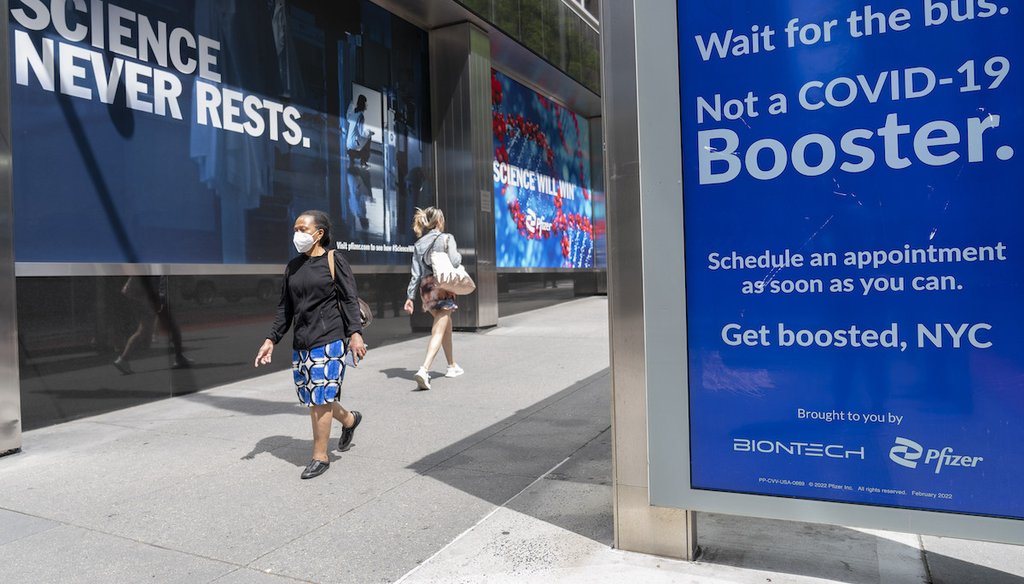Get PolitiFact in your inbox.

Pedestrians walk past a signs hanging outside Pfizer headquarters in New York and one hanging at a bus stop encouraging the Covid-19 booster, May 23, 2022. (AP)
If Your Time is short
- On Aug. 31, the U.S. Food and Drug Administration authorized the use of updated COVID-19 booster shots.
- The boosters — which were tested in mice — were authorized before data could be gathered from human trials, because of the pressing need to address the rapidly changing nature of coronavirus variants, a vaccination expert told PolitiFact.
- The updated vaccines from Pfizer and Moderna are designed to specifically protect against the omicron variant.
- Only minor changes were made to the original vaccine’s formula, and the testing the booster underwent is similar to testing of the annual flu vaccine.
An updated COVID-19 booster shot is now available, as strains of the coronavirus continue to spread.
President Joe Biden said Sept. 6 that the updated boosters are meant to provide the strongest protection against the omicron strain, which didn't exist when the original vaccines were developed in 2020.
On. Aug. 31, the U.S. Food and Drug Administration authorized the updated boosters from Moderna and Pfizer, which had not been tested in humans, only in mice. The agency said it based its decision on the "totality of available evidence," including the safety and effectiveness of the original vaccines.
Vaccination experts said the updated booster was developed that way so it could be made and distributed as soon as possible. They also said only minor changes were made to the original vaccine’s formula to specifically target variant strains, and the testing it underwent is similar to testing of the annual flu vaccine.
"There is always some possibility of a new safety concern arising when we haven’t had clinical trials, but in this case the safety risk is likely small," said Genevieve Kanter, assistant professor of medicine, medical ethics and health policy at the University of Pennsylvania. "There isn’t anything new being done in the vaccine manufacturing process."
The lack of testing in humans sparked skepticism on social media about the vaccine’s safety. "How can we really continue to just 'trust the science?'" English actor Russell Brand asked in an Aug. 31 Facebook post.
What is in the updated boosters?
The FDA revised the emergency use authorizations for the Moderna and Pfizer COVID-19 vaccines to allow for modified versions of the vaccines to be used as "updated boosters." These boosters contain components of the original strain of the virus as well as components of omicron variant BA.4 and BA.5, and are expected to target those strains of the omicron variant.
The first Moderna and Pfizer boosters, which became widely available for adults in November 2021, were an additional dose of the original vaccines, without any modifications.
Updated boosters’ testing and authorization
The mRNA technology behind the Moderna and Pfizer vaccines has been around since the 1990s, which allowed scientists to develop the COVID-19 vaccines within a year of the virus being identified.
Because mRNA vaccines are made fairly quickly and easily, it doesn’t take much to modify them to adapt to new strains of the virus, said Dr. Margaret Liu, International Society for Vaccines board co-chair and president emeritus. The society is a nonprofit organization encouraging the development and use of vaccines.
The updated boosters were tested for effectiveness in mice and authorized before data could be gathered from human trials because of the pressing need to address the rapidly changing nature of coronavirus variants, Liu said.
The coronavirus continues to mutate to "escape the antibody immune responses" people have developed from initial COVID-19 vaccines and previous infection, she said.
FDA Commissioner Dr. Robert Califf said in an Aug. 25 tweet that when considering the updated boosters, the agency looked at human clinical trial data of prior COVID-19 boosters and real-world evidence from the current vaccines, which have been safely administered to more than 220 million people in the United States alone
Califf also said that based on previous experience with the flu vaccine, "strain changes can be made without affecting safety."
"Given that this technology hasn’t changed, it’s not a stretch to believe that the boosters, with slightly changed mRNA, will do the same in terms of protection against the new variants," said Kanter, the University of Pennsylvania professor.
Updated boosters and safety
The new vaccines were not tested in people, but the human trials involving the original vaccines and previous boosters proved they were safe, experts said.
"Frankly, the biggest downside is less the safety aspect and more the efficacy aspect," Kanter said. "Perhaps there will be other variants emerging in the fall instead of BA.4 and BA.5."
People who get an updated booster may experience soreness at the injection site and fatigue, side effects similar to the previous vaccines, Liu said. Other commonly reported side effects include headache, muscle pains, fever and nausea.
The Centers for Disease Control and Prevention has encouraged people to get updated booster shots as soon as they become available to them. CDC Director Dr. Rochelle Walensky said the recommendation came after a "comprehensive scientific evaluation and robust scientific discussion."
Testing process was similar to flu shot
The animal testing for the updated booster shots was similar to the testing process for the influenza vaccine.
Liu said the flu vaccine changes annually to combat the prevailing strains of the virus. Because the original formulation of the flu vaccine has already received FDA approval, it doesn’t have to undergo full clinical trials each time a new version is released.
Our Sources
Email with Genevieve Kanter, assistant professor of medicine, medical ethics and health policy at the University of Pennsylvania, Sept. 6, 2022
Email with Margaret Liu, co-chair of the board and president emeritus of the International Society for Vaccines, Sept. 6, 2022
Russell Brand, Facebook post, Aug. 31, 2022
FDA, "Coronavirus (COVID-19) Update: FDA Authorizes Moderna, Pfizer-BioNTech Bivalent COVID-19 Vaccines for Use as a Booster Dose," Aug. 31, 2022
CDC, "CDC Expands Eligibility for COVID-19 Booster Shots to All Adults," Nov. 19, 2021
The Washington Post, "What to know about coronavirus booster shots in the U.S.," Sept. 27, 2021
The New York Times, "Biden Administration Plans to Offer Updated Booster Shots in September," July 28, 2022
The White House, "Statement by President Biden on FDA and CDC Authorizing Updated COVID-19 Vaccines," Sept. 6, 2022
Dr. Robert Califf, Twitter post, Aug. 25, 2022
NPR, "How are the COVID-19 vaccine and booster campaigns going in your state," Sept. 5, 2022
PolitiFact, "Ask PolitiFact: How can COVID vaccines be safe when they were developed so fast," March 28, 2021
CDC, Possible Side Effects After Getting a COVID-19 Vaccine, Aug. 15, 2022
CDC, "CDC Recommends the First Updated COVID-19 Booster," Sept. 1, 2022
































